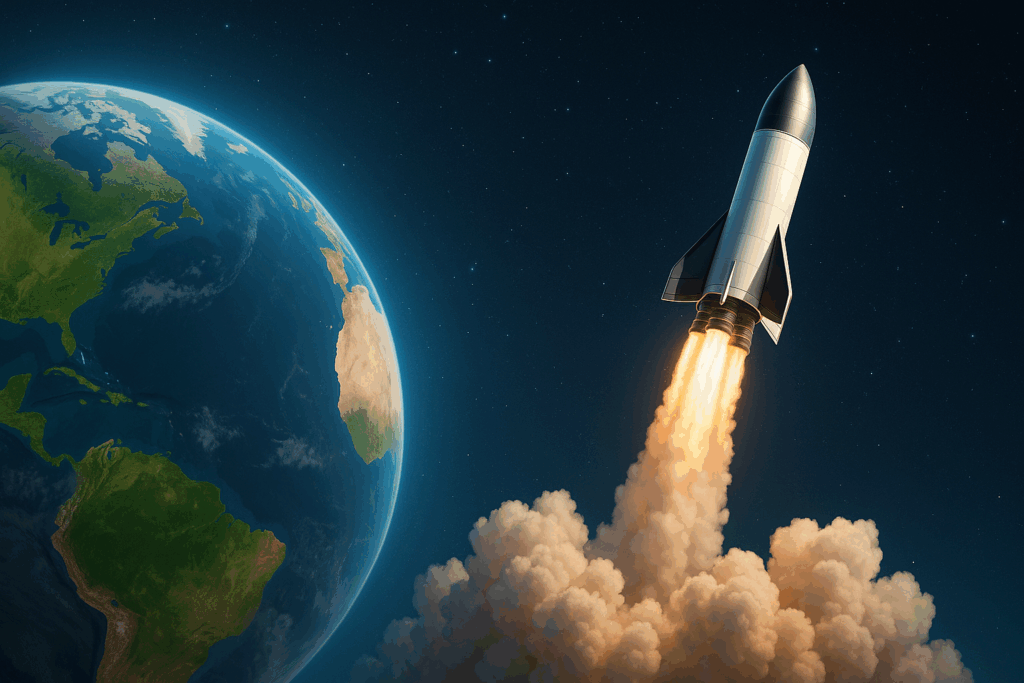Space Exploration: A Modern Necessity, Not a Luxury
Written by Aruna Devi TM
With the now-regular news of space missions launching or the billions being invested in space exploration or new developments in the space industry, it feels natural for some people to wonder: shouldn’t we be focusing on problems here on Earth first? With climate change accelerating, healthcare systems strained, and poverty affecting millions, a resounding cry we hear often falls along the lines of “why are we spending so much money looking up at the stars?”
Here’s a surprising truth: space exploration isn’t taking resources away from solving Earth’s problems, it’s actually helping us solve them faster and more effectively than ever before.
Think about your daily life.
When you check the weather forecast, use GPS navigation, make a video call to family across the globe, or receive early warnings about natural disasters, you’re benefiting directly from space-based technologies. Satellites orbiting our planet right now are monitoring climate change in real-time, tracking ocean health, assessing water availability, and providing the data scientists need to make informed decisions about our environment.
But the benefits go far deeper than weather satellites and communication networks.
Space exploration drives innovation in ways that transform entire industries. When engineers develop solar panels efficient enough to power spacecraft millions of miles from the Sun, those same technologies revolutionize renewable energy here on Earth. When scientists create lightweight, durable materials for space missions, those materials find their way into everything from medical devices to sustainable construction. The computer in your pocket exists partly because of technologies first developed for space exploration decades ago.
A look at the NASA Spinoff webpage will reveal over 2,000 products that we use in our daily lives that have come directly from research and investment in space exploration: improved fabrics and textiles, exercise machines, food, medicines, agricultural improvements, medical procedures, smart tech, sensors, and far, far more.

Perhaps most importantly, space exploration is our insurance policy against several real existential threats.
Right now, millions of asteroids and thousands of comets are hurtling through our solar system, and some of these objects cross Earth’s orbit from time-to-time. It’s not a matter of if one will pose a serious threat: any look at the past shows that impacts from space will happen again. Projects like all-sky surveys for Near Earth Objects (NEOs) and other materials in space, along with a realm of research on planetary protection and asteroid redirect technologies (like NASA’s DART mission), aren’t science fiction; they’re essential early warning systems and threat mitigation tools that could one day save our entire civilization. By developing the technology to detect and deflect dangerous asteroids, we’re literally protecting every single living thing on Earth.
The economic benefits of space exploration are equally compelling.
The space industry creates high-paying jobs, drives technological innovation, and generates new industries that didn’t exist before. The National Space Society estimates that every 1 dollar (in USD) invested in space exploration today accounts for up to 40 dollars in economic growth. A return-on-investment (ROI) of 400% far exceeds the average ROI for most asset classes and industries. For example, the historical average return of the S&P 500, a benchmark for the US stock market, is around 6-10% annually. Countries that invest in space programs consistently outperform others in innovation rankings and economic competitiveness.
Space exploration also brings out the best in human collaboration.
When facing the technical challenges of exploring the cosmos, nations that might otherwise compete or conflict find themselves working together toward common goals. The International Space Station stands as evidence that even the most complex global challenges can be solved when we unite our efforts and resources.
The reality is that space exploration represents humanity’s research and development department for solving tomorrow’s challenges today. It’s not about escaping Earth, it’s about better understanding our planet, protecting it from threats, and developing the technologies we need to create a sustainable future for everyone.
So the next time someone asks whether space exploration is worth the investment, remember this: every time we reach for the stars, we’re actually reaching for a better life here on Earth. In our interconnected world facing unprecedented challenges, space exploration isn’t a luxury we can debate, it’s a necessity we can’t afford to ignore.
Aruna Devi TM is a space science communicator and Dr. Kalpana Chawla Scholar with a background in IT and astrobiology. She has contributed to international conferences on AI-driven space research and planetary exploration. Aruna actively promotes STEM outreach and interdisciplinary learning in space sciences.
